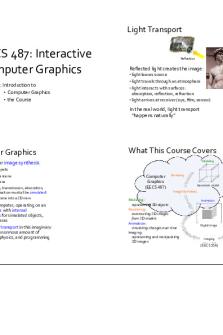430outline-2021 - Lecture notes 1 PDF

| Title | 430outline-2021 - Lecture notes 1 |
|---|---|
| Course | Biology |
| Institution | University of Waterloo |
| Pages | 3 |
| File Size | 37 KB |
| File Type | |
| Total Downloads | 1 |
| Total Views | 159 |
Summary
Information about the class...
Description
Course outline Course number
Chem 430
Course title
Biochemical Pharmacology
Instructor
Michael Palmer (Chemistry department)
Term offered
Fall 2021
Meeting dates
Tuesdays and Thursdays
Meeting times
1:30 p.m. to 2:30 p.m.
Location
Online (Microsoft Teams)
Office hours
n/a—please contact me by email [email protected]
Teaching assistant
n/a
Course objectives
Gain an in-depth understanding of the biochemical principles of drug action
Required readings
Lecture notes (see https://tinyurl.com/pharma-notes)
Evaluation
There will be no midterm or final exams. Evaluation will be based entirely on assignments. There will be four assignments overall, each for 25% of the overall course credit. Each assignment will focus on a theme related to the course content; typically, you will be asked to comment on the findings reported in research paper. Your answers will be subject to a word count limit. Submission will be arranged through the Learn website.
Overview of topics 1. Introduction 2. Pharmacodynamics: General principles of drug action 3. Pharmacokinetics: Uptake, distribution, and elimination of drugs 4. Pharmacology of nerve and muscle cells 5. G protein-coupled receptors as drug targets 6. Drugs that modulate nitric oxide signalling 1
7. Eicosanoid mediators and related drugs 8. Antimicrobial chemotherapy 9. Anti-cancer chemotherapy 10. Drug delivery 11. RNA as a drug target 12. Drug discovery
Legalese Academic Integrity: In order to maintain a culture of academic integrity, members of the University of Waterloo community are expected to promote honesty, trust, fairness, respect and responsibility. [Check www.uwaterloo.ca/academicintegrity/ for more information.] Grievance: A student who believes that a decision affecting some aspect of his/her university life has been unfair or unreasonable may have grounds for initiating a grievance. Read Policy 70, Student Petitions and Grievances, Section 4, www.adm.uwaterloo.ca/infosec/ Policies/policy70.htm. When in doubt please be certain to contact the department’s administrative assistant who will provide further assistance. Discipline: A student is expected to know what constitutes academic integrity [check www. uwaterloo.ca/academicintegrity/] to avoid committing an academic offence, and to take responsibility for his/her actions. A student who is unsure whether an action constitutes an offence, or who needs help in learning how to avoid offences (e.g., plagiarism, cheating) or about rules for group work/collaboration should seek guidance from the course instructor, academic advisor, or the undergraduate Associate Dean. For information on categories of offences and types of penalties, students should refer to Policy 71, Student Discipline, www.adm.uwaterloo.ca/infosec/Policies/policy71.htm. For typical penalties check Guidelines for the Assessment of Penalties, www.adm.uwaterloo.ca/infosec/guidelines/penaltyguidelines.htm. Appeals: A decision made or penalty imposed under Policy 70 (Student Petitions and Grievances) (other than a petition) or Policy 71 (Student Discipline) may be appealed if there is a ground. A student who believes he/she has a ground for an appeal should refer to Policy 72 (Student Appeals) www.adm.uwaterloo.ca/infosec/Policies/policy72. htm.
2
Note for Students with Disabilities: The Office for Persons with Disabilities (OPD), located in Noodles Hell, Room 1132, collaborates with all academic departments to arrange appropriate accommodations for students with disabilities without compromising the academic integrity of the curriculum. If you require academic accommodations to lessen the impact of your disability, please register with the OPD at the beginning of each academic term.
3...
Similar Free PDFs

Lecture notes, lecture 1
- 9 Pages

Lecture notes, lecture 1
- 4 Pages

Lecture-1-notes - lecture
- 1 Pages

Lecture notes- Lecture 1
- 20 Pages

Lecture notes, lecture 1
- 4 Pages

Lecture-1 - Lecture notes 1
- 6 Pages

Lecture notes, lecture 1
- 9 Pages

1 - Lecture notes 1
- 11 Pages

1 - Lecture notes 1
- 5 Pages

1 - Lecture notes 1
- 1 Pages

1 - Lecture notes 1
- 24 Pages

Lecture notes, lecture 1-9
- 25 Pages

Lecture notes, lecture scratch 1
- 7 Pages

Lecture notes, lecture 1-7
- 17 Pages

Lecture notes, lecture 1-18
- 26 Pages
Popular Institutions
- Tinajero National High School - Annex
- Politeknik Caltex Riau
- Yokohama City University
- SGT University
- University of Al-Qadisiyah
- Divine Word College of Vigan
- Techniek College Rotterdam
- Universidade de Santiago
- Universiti Teknologi MARA Cawangan Johor Kampus Pasir Gudang
- Poltekkes Kemenkes Yogyakarta
- Baguio City National High School
- Colegio san marcos
- preparatoria uno
- Centro de Bachillerato Tecnológico Industrial y de Servicios No. 107
- Dalian Maritime University
- Quang Trung Secondary School
- Colegio Tecnológico en Informática
- Corporación Regional de Educación Superior
- Grupo CEDVA
- Dar Al Uloom University
- Centro de Estudios Preuniversitarios de la Universidad Nacional de Ingeniería
- 上智大学
- Aakash International School, Nuna Majara
- San Felipe Neri Catholic School
- Kang Chiao International School - New Taipei City
- Misamis Occidental National High School
- Institución Educativa Escuela Normal Juan Ladrilleros
- Kolehiyo ng Pantukan
- Batanes State College
- Instituto Continental
- Sekolah Menengah Kejuruan Kesehatan Kaltara (Tarakan)
- Colegio de La Inmaculada Concepcion - Cebu
